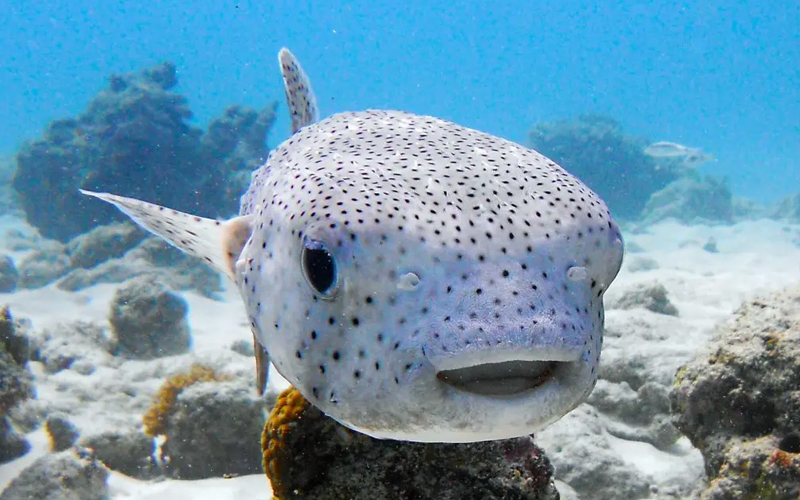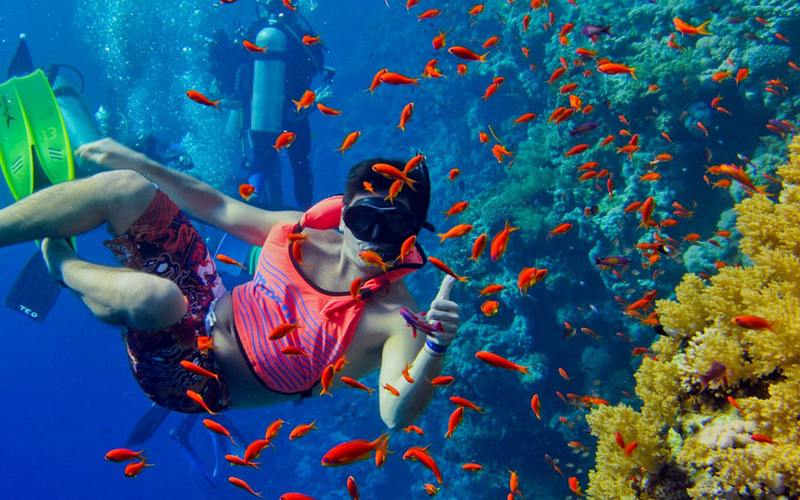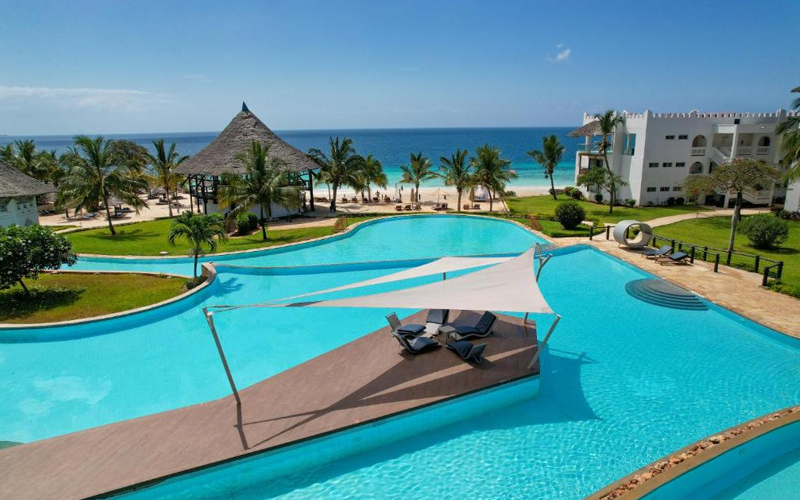Tanzania’s crystal-clear waters and vibrant coral reefs make it a paradise for snorkeling enthusiasts seeking to explore the wonders of the underwater world. From colorful coral gardens teeming with marine life to pristine beaches fringed by swaying palms, Tanzania offers a snorkeling experience like no other. As visitors immerse themselves in the turquoise waters of the Indian Ocean, they discover an underwater realm brimming with beauty, biodiversity, and adventure.
Tanzania’s Marine Ecosystem
- Coral Reefs: Tanzania’s coastline is adorned with extensive coral reef systems, which form the backbone of the region’s marine ecosystem. These reefs provide crucial habitat for a diverse array of marine species, including colorful corals, tropical fish, sea turtles, and reef sharks. The health and vitality of Tanzania’s coral reefs are a testament to the region’s rich biodiversity and ecological significance.
- Marine Life Diversity: Tanzania’s marine waters are home to an astonishing variety of marine life, from tiny reef-dwelling creatures to magnificent megafauna. Snorkelers can expect to encounter a kaleidoscope of marine species, including clownfish, parrotfish, butterflyfish, moray eels, and rays, as well as larger inhabitants such as dolphins, whales, and whale sharks. The abundance of marine life ensures that every snorkeling excursion in Tanzania is filled with excitement and discovery.
Top Snorkeling Destinations
- Mnemba Atoll: Located off the northeast coast of Zanzibar, Mnemba Atoll is renowned for its pristine coral reefs and crystal-clear waters, making it a premier snorkeling destination in Tanzania. The atoll’s protected marine reserve is home to a spectacular array of marine life, including colorful corals, reef fish, and green sea turtles. Guided snorkeling tours offer visitors the opportunity to explore Mnemba’s underwater wonders and encounter its resident marine species up close.
- Mafia Island Marine Park: Mafia Island Marine Park, situated off the coast of mainland Tanzania, is a hidden gem known for its unspoiled reefs and diverse marine biodiversity. The park’s calm, sheltered waters make it an ideal snorkeling spot for beginners and experienced snorkelers alike. Visitors can snorkel along the fringing reefs, swim with manta rays and whale sharks, and marvel at the vibrant coral gardens teeming with life.
- Chumbe Island Coral Park: Chumbe Island Coral Park, located off the coast of Zanzibar, is a marine sanctuary dedicated to the conservation of coral reefs and marine life. The park’s protected reefs boast some of the healthiest coral formations in the region, offering a visually stunning and ecologically significant snorkeling experience. Guided reef walks and snorkeling excursions provide visitors with insights into the park’s conservation efforts and the importance of protecting Tanzania’s marine heritage.
Snorkeling Experience
- Equipment and Safety: Snorkeling in Tanzania requires basic equipment, including a mask, snorkel, fins, and a buoyancy aid. It’s essential to choose high-quality snorkeling gear that fits comfortably and provides a clear view of the underwater world. Safety is paramount when snorkeling, and beginners should always snorkel under the supervision of a certified guide or instructor who can provide instruction on proper techniques, safety procedures, and marine etiquette.
- Guided Tours and Excursions: Guided snorkeling tours and excursions are available at most snorkeling destinations in Tanzania, offering visitors the opportunity to explore the reefs with experienced guides who know the best snorkeling spots and can point out interesting marine life. These tours typically include boat transfers, snorkeling equipment rental, and snorkeling instruction, ensuring a safe and enjoyable experience for snorkelers of all levels.
Marine Conservation Efforts
- Coral Reef Protection: Tanzania is committed to the conservation and preservation of its coral reefs and marine ecosystems. Protected marine areas, such as marine parks and reserves, play a crucial role in safeguarding the health and vitality of Tanzania’s coral reefs by regulating human activities, promoting sustainable tourism practices, and conducting research and monitoring programs. Visitors can support marine conservation efforts by practicing responsible snorkeling behaviors, such as avoiding touching or damaging coral reefs and refraining from littering or polluting the marine environment.
- Sustainable Tourism Practices: Sustainable tourism practices are essential for minimizing the environmental impact of snorkeling activities in Tanzania. Tour operators and snorkeling providers adhere to responsible tourism guidelines, such as minimizing boat traffic, reducing waste and pollution, and educating visitors about the importance of marine conservation. By choosing eco-friendly tour operators and supporting sustainable tourism initiatives, visitors can contribute to the long-term health and sustainability of Tanzania’s marine ecosystems.
Best Time to Snorkel
- Seasonal Highlights
The best time to snorkel in Tanzania depends on the traveler’s preferences and the destination. Generally, the dry season, from June to October, offers excellent visibility and calm seas, making it ideal for snorkeling adventures. However, the wet season, from November to May, brings warmer waters and increased marine activity, including the chance to see whale sharks and manta rays. Each season offers unique snorkeling opportunities, ensuring that visitors can enjoy Tanzania’s underwater paradise year-round.
Culinary Delights
- Seafood Cuisine: After a day of snorkeling adventures, visitors can savor the flavors of Tanzania’s culinary delights, with a focus on fresh seafood dishes prepared with locally sourced ingredients. From grilled fish and octopus skewers to coconut-infused curries and seafood platters, Tanzania’s coastal cuisine delights the taste buds with its bold flavors and aromatic spices. Dining at beachside restaurants and seafood shacks allows visitors to enjoy the catch of the day while soaking in the panoramic views of the Indian Ocean.
- Beachside Dining: Beachside dining is a quintessential part of the snorkeling experience in Tanzania, with many coastal resorts and beachfront eateries offering al fresco dining options overlooking the ocean. Whether enjoying a romantic dinner under the stars or a casual lunch with toes in the sand, beachside dining allows visitors to savor the tranquility and beauty of Tanzania’s coastal landscapes while indulging in delicious cuisine inspired by the sea.
Accommodation Options
- Beach Resorts: Tanzania’s coastal regions offer a range of beach resorts and luxury accommodations that cater to snorkeling enthusiasts seeking a comfortable and convenient base for their underwater adventures. Beach resorts like Matemwe Lodge and Pole Pole provide guests with spacious villas, ocean views, and access to private beaches, as well as snorkeling excursions and other water-based activities.
- Eco-friendly Lodges: For travelers seeking a more sustainable and eco-friendly lodging option, Tanzania offers a variety of eco-lodges and eco-resorts that prioritize environmental conservation and responsible tourism practices. Eco-lodges like Chole Mjini and The Manta Resort provide guests with unique accommodations, such as treehouses and eco-bands, as well as opportunities to engage with local communities and participate in conservation initiatives.
Cultural Immersion
- Local Communities: Exploring Tanzania’s coastal communities allows visitors to immerse themselves in the local culture and way of life. Snorkeling excursions often include visits to traditional fishing villages, where visitors can interact with local fishermen, learn about traditional fishing techniques, and gain insights into the cultural heritage of coastal communities. Engaging with local communities provides a deeper understanding of Tanzania’s marine environment and the importance of sustainable livelihoods.
- Cultural Experiences: Tanzania’s coastal regions are rich in cultural heritage, with a blend of African, Arab, and Indian influences shaping the traditions and customs of coastal communities. Visitors can participate in cultural experiences such as Swahili cooking classes, spice farm tours, and traditional music and dance performances, offering a glimpse into the vibrant cultural tapestry of Tanzania’s coastal regions.
Health and Safety Tips
- Sun Protection: Sun protection is essential when snorkeling in Tanzania’s tropical climate, as prolonged exposure to the sun can cause sunburn and dehydration. Snorkelers should wear sunscreen with high SPF, protective clothing such as rash guards and hats, and sunglasses with UV protection to shield their skin and eyes from the sun’s harmful rays.
- Reef Etiquette: Responsible snorkeling behavior is crucial for protecting Tanzania’s coral reefs and marine ecosystems. Snorkelers should avoid touching or damaging coral reefs, refrain from standing on or kicking coral formations, and practice good buoyancy control to minimize contact with the reef. By respecting marine life and adhering to reef etiquette, snorkelers can help preserve Tanzania’s underwater paradise for future generations to enjoy.
Snorkeling in Tanzania offers an unparalleled opportunity to explore the wonders of the underwater world, from vibrant coral reefs teeming with marine life to pristine beaches bathed in sunlight. With its rich biodiversity, crystal-clear waters, and commitment to marine conservation, Tanzania invites snorkeling enthusiasts to dive into an underwater paradise unlike any other. Whether exploring coral gardens, swimming with sea turtles, or indulging in coastal cuisine, snorkelers in Tanzania are sure to be captivated by the beauty and diversity of the marine environment.
FAQs
Is snorkeling suitable for beginners in Tanzania?
Yes, snorkeling is suitable for beginners in Tanzania, with guided tours and instruction available for those new to the activity. Many snorkeling destinations offer calm, shallow waters ideal for beginners to practice their skills and explore at their own pace.
What marine life can I expect to see while snorkeling in Tanzania?
While snorkeling in Tanzania, visitors can expect to see a diverse array of marine life, including colorful corals, tropical fish, sea turtles, rays, dolphins, and occasionally, whale sharks and manta rays. The region’s rich biodiversity ensures that every snorkeling excursion is filled with fascinating encounters with marine species.
Are there any age restrictions for snorkeling excursions?
Age restrictions for snorkeling excursions may vary depending on the tour operator and destination. While snorkeling is generally suitable for people of all ages, children should be comfortable in the water and able to swim independently. It’s essential to check with the tour operator regarding any age restrictions or requirements before booking a snorkeling excursion.
Can I rent snorkeling equipment in Tanzania?
Yes, snorkeling equipment is readily available for rent at most snorkeling destinations in Tanzania, including masks, snorkels, fins, and buoyancy aids. Rental shops and tour operators offer high-quality snorkeling gear in various sizes, ensuring a comfortable and safe snorkeling experience for visitors.
How can I contribute to marine conservation efforts while snorkeling in Tanzania?
Visitors can contribute to marine conservation efforts while snorkeling in Tanzania by practicing responsible snorkeling behaviors, supporting sustainable tourism initiatives, and participating in conservation activities such as reef cleanups and coral monitoring programs. By minimizing their environmental impact and promoting marine conservation awareness, snorkelers can help protect Tanzania’s marine ecosystems for future generations to enjoy.
Go through these pages to learn more about Tanzania;
| Tanzania Travel Guide |
| Things To Do In Tanzania |
| Yellow Fever Entry Requirements |
| Safety Guidelines |




